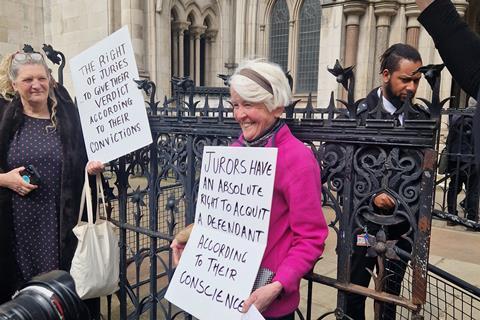The High Court has thrown out an application by the Solicitor General to prosecute a 69-year-old for contempt of court after she held up a sign about jurors’ rights.
Mr Justice Saini dismissed the claim in its entirety. He stated that the law officer had brought a case that demonstrated a ‘mischaracterisation of what Miss [Trudi] Warner did’ as well as a ‘failure to recognise the placard said what is essentially regularly read by Old Bailey jurors’.
Former social worker Warner was charged last year for holding a sign outside the trial of climate activists. She was described in court as a ‘human billboard’. Her placard said: ‘Jurors. You have an absolute right to acquit a defendant according to your conscience’. The sign referred to a marble plaque in the Old Bailey acknowledging jurors in the 1670 'Bushel’s case', in which a jury refused a judge’s direction to find the defendants guilty.

Handing down his judgment in the Royal Courts of Justice today, Saini said Warner’s placard was ‘informative’ and ‘did not give instructions’.
The judge told the packed court he rejected the argument Warner had ‘confronted jurors and followed jurors to intercept them’. He said those arguments ‘mischaracterise the evidence’, adding that ‘CCTV does not disclose reasonable basis that the court can be sure of those accusations’.
He said Warner ‘did not gesture towards an individual or even talk to people walking along the footpath’ and that her placard ‘does not present as argued…an instruction or encouragement’.
In his written judgment, Saini said the Solicitor General ‘does not have a reasonable basis in fact and law for pursuing these proceedings on the basis of the common law form of contempt’ adding that Warner’s conduct did not amount to an actionable contempt.
Of the placard, the judge said it did not present ‘an "instruction or encouragement" or constitute a "plain invitation" to passers-by to discharge their duties in a particular way’.
He said the text was ‘informative’ and ‘did not implore jurors to act or give an instruction’ but ‘simple communicated directly with jurors to summarise the principle of jury equity which is…indeed very similar to the Old Bailey plaque’.
Warner’s case did not come ‘arguably close’ to meeting the legal test for the common law species of contempt of a serious risk or actual interface with the administration of justice.
The judge said: ‘The highest that [the Solicitor General] can put his case is that as a result of Ms Warner’s acts, HHJ Reid delivered a short, tailored judicial direction the day after the events.
‘Any risk arising out of jurors being made aware of the legal principle of jury equity on the first day of trial would have been adequately addressed via the brief jury direction he gave. That risk cannot, on any proper analysis, be considered “serious” given there is a straightforward way to minimise the risk of prejudice.’
He added that a criminal prosecution was a ‘disproportionate approach to this situation in a democratic society’.
Speaking outside court, Warner said she was ‘very relieved’ by the result, which was handed down on Earth Day. She added: ‘I am very happy. I hope it is going to make a difference to other people. I have had the most amazing support.’
This article is now closed for comment.



























17 Readers' comments